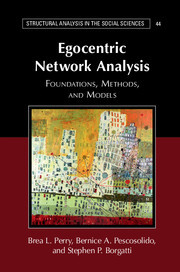Description
Egocentric Network Analysis
Foundations, Methods, and Models
Structural Analysis in the Social Sciences Series
Authors: Perry Brea L., Pescosolido Bernice A., Borgatti Stephen P.
An in-depth, comprehensive and practical guide to egocentric network analysis, focusing on fundamental theoretical, research design, and analytic issues.
Language: English
Approximative price 39.35 €
In Print (Delivery period: 14 days).
Add to cart
Egocentric Network Analysis
Publication date: 03-2018
366 p. · 15.3x22.8 cm · Paperback
Publication date: 03-2018
366 p. · 15.3x22.8 cm · Paperback
Approximative price 77.67 €
In Print (Delivery period: 14 days).
Add to cart
Egocentric Network Analysis
Publication date: 03-2018
366 p. · 15.8x23.6 cm · Hardback
Publication date: 03-2018
366 p. · 15.8x23.6 cm · Hardback
Description
/li>Contents
/li>Biography
/li>
Egocentric network analysis is used widely across the social sciences, especially in anthropology, political science, economics, and sociology, and is increasingly being employed in communications, informatics, and business and marketing studies. Egocentric network analysis requires a unique set of data collection and analysis skills that overlap only minimally with other network methodologies. However, until now there has been no single reference for conceptualizing, collecting, and analyzing egocentric social network data. This comprehensive guide to study design, data collection, and analysis brings together the state of knowledge with the most effective research tools to guide newcomers to this field. It is illustrated with many engaging examples and graphics and assumes no prior knowledge. Covering the entire research process in a logical sequence, from conceptualizing research questions to interpreting findings, this volume provides a solid foundation for researchers at any stage of their career to learn and apply ego network methods.
Preface; Part I. Theoretical and Methodological Foundations: 1. The nature of networks; 2. Sociocentric and egocentric approaches to networks; Part II. Research Design for Ego Networks: 3. Sampling, data collection modes, and research ethics; 4. Methods for eliciting alters; 5. Methods for gathering data about alters; Part III. Analyzing Ego Networks: 6. Visualizing ego networks; 7. Ego network composition and structure; 8. Multivariate and multilevel regression models for ego networks; 9. Modeling ego network dynamics; 10. Relating egocentric and sociocentric network analysis; Conclusion.
Brea L. Perry is Associate Professor of Sociology at Indiana University and an affiliate of the Network Science Institute.
Stephen P. Borgatti is Paul Chellgren Endowed Chair and Professor of Management in the Gatton College of Business and Economics, University of Kentucky.
Bernice A. Pescosolido is Distinguished Professor of Sociology at Indiana University and Co-Director of the Network Science Institute.
Stephen P. Borgatti is Paul Chellgren Endowed Chair and Professor of Management in the Gatton College of Business and Economics, University of Kentucky.
Bernice A. Pescosolido is Distinguished Professor of Sociology at Indiana University and Co-Director of the Network Science Institute.
© 2024 LAVOISIER S.A.S.




